بررسی تأثیر تلاش بازاریابی برندهای لوکس بر ارزش ویژه نام تجاری و رفتار مصرفکننده (مطالعه موردی: مصرفکنندگان ایرانی برندهای لوکس در رسانههای اجتماعی)
محورهای موضوعی : توسعه مدلهای کسب و کار در بنگاههای کوچک و متوسطمسعود توصیفیان 1 , علی رمضانی 2 *
1 - دانشگاه آزاد اسلامی واحد کرج
2 - دانشکاه آزاد اسلامی واحد کرج
چکیده مقاله :
باتوجه به اینکه بازاریابی برندهای لوکس در رسانههای اجتماعی یکی از انواع بازاریابی دیجیتالی است و هدف برقراری ارتباط با مخاطبان و مشتریان به منظور ارائه خدمات و کسب و کار است، میتوان از رسانههای اجتماعی برای بازاریابی اینترنتی استفاده کرد. هدف از این مطالعه بررسی تأثیر تلاش بازاریابی برندهای لوکس بر ارزش ویژه برند و رفتار مصرفکننده است، تحقیق حاضر از نوع کاربردی و روش بکار گرفته شده در این تحقیق تحلیلی- پیمایشی بود. جامعه مورد مطالعه مصرفکنندگان ایرانی برندهای لوکس در رسانههای اجتماعی (مشتریان) بود که تعداد آنان نامحدود است و با توجه به تعداد نامحدود آنان برای تعیین حجم نمونه از فرمول کوکران و با خطای 05/0 بصورت تصادفی 385 نفر با روش نمونهگیری تصادفی ساده انتخاب گردید. جهت گردآوری اطلاعات و دادههای مورد نیاز به منظور بررسی فرضیههای تحقیق از پرسشنامه استفاده شد. در آمار استنباطی ابتدا ابعاد مورد نظر تعيين و شاخصها استخراج گردید، پس از بررسی پایایی و روایی پرسشنامه، نرمالبودن دادهها با استفاده از آزمون کلموگروف اسمیرنف بررسی و سپس با استفاده از آزمون همبستگی پیرسون و مدلسازی معادلات ساختاری و نرمافزار SPSS و lisrel به بررسی فرضیات پرداخته شد. براساس نتایج بهدست آمده تمام فرضیات پذیرفته شدند. بطوریکه تلاش بازاریابی برندهای لوکس در رسانههای اجتماعی بر ارزش ویژه برند مبتنی بر مصرفکننده دارای بیشترین تأثیر به میزان 95/0 بود.
Given that Brand marketing in social media is one type of digital marketing that aims to communicate with audiences and customers in order to provide products, services and business, so that social media can be used for Internet marketing. The aim of this study is to investigate the effect of brand marketing on brand equity and consumer behavior. This study is an applied research with qualitative approach. The population of this study was Iranian consumers of social media brands (customers) whose number is unlimited. Due to their unlimited number of samples, the Cochran formula was used to determine the sample size and randomly selected 385 random errors of 0.05 by simple random sampling method. To invenstigate the research hypotheses, a questionnaire was used for data collection. In the inferential statistics, firstly, the dimensions were determined and the indexes were extracted. After checking the reliability and validity of the questionnaire, to normalize collected data, Kolmogorov smirnov test was applied. Then the research hypothesens were examined using pearson correlation test and structural equation modeling. Based on the results, all assumptions were accepted. As marketing efforts of brands in social media had the highest impact on the consumer brand value of 0.95.
1- خیری، سحر، "رابطه مشتریمداری و ارزش ویژه برند آناتا (مطالعه موردی: شرکت آناتا)"، مدیریت زنجیره ارزش، 1395، صفحات 15-42.
2- رشیدی، حسن، "برند و تأثیر آن بر وفاداری مشتری، مجله اقتصادی"، 1395، صفحات 65-80.
3- دهدشتی، شاهرخ, زهره و علی محمدی، "شبکههای اجتماعی و تبلیغات دهان به دهان کتبی در ارزش ویژهی برند"، کنفرانس ملی رویکردهای نوین در علوم مدیریت، اقتصاد و حسابداری، مازندران، مؤسسه علمی تحقیقاتی کومه علمآوران دانش، ۱۳۹۴.
4- R. Madleňák, L. Madleňáková, "Analysis of website traffic dependence on use of selected internet marketing tools". Procedia Economics and Finance, 2015, pp.123-8.
5- P. Carrera, A. Caballero, "Abstractness leads people to base their behavioral intentions on desired attitudes", Journal of Experimental Social Psychology, 2017, pp. 27-33.
6- S. Pace, B. Balboni, "The effects of social media on brand attitude and WOM during a brand crisis: Evidences from the Barilla case", Journal of Marketing Communications, 2017, pp. 135-48.
7- JS. Suki, J. Sasmita, "Young consumers’ insights on brand equity: Effects of brand association, brand loyalty, brand awareness, and brand image", International Journal of Retail & Distribution Management, 2015, pp.276-92.
8- Aaker, D. A., "Managing Brand Equity: Capitilizing on the value of brand name”, The Free Press, 1991, pp. 247-248.
9- SM. Zavattaro, JJ. Daspit, "Assessing managerial methods for evaluating place brand equity: A qualitative investigation", Tourism Management, 2015, pp. 11-21.
10- A. Lu, D. Gursoy, "Authenticity perceptions, brand equity and brand choice intention: The case of ethnic restaurants", International Journal of Hospitality Management, 2015, pp. 36-45.
11- Keller, K. L., "Strategic brand management: building, measuring, and managing brand equity", 3rd edition. New Jersey: Pearson Education International, 2008, pp 71-83.
12- Keller, K.L., "Conceptualizing, measuring, and managing customer-based brand equity.", Journal of Marketing, 1993, pp 22-57.
13- JO. Owino, M. Cherotich, "The Influence of Social Media on Brand Equity in Kenyan Banking Industry", Pyrex Journal of Business and Finance Management Research, 2016, pp. 1-5.
14- FM. Thompson, A. Newman, "The moderating effect of individual level collectivist values on brand loyalty", Journal of Business Research, 2014, pp. 2437-46.
15- N Rubio, J Oubiña, M Gómez-Suárez, "Understanding brand loyalty of the store brand’s customer base", Journal of Product & Brand Management 24 (7), 2015, pp 679-692.
16- Lin, Yi Hsin, "Innovative brand experience's influence on brand equity and brand satisfaction", Journal of business research, 2015, pp. 2254-2259.
17- Lee, Dongwon, Junghoon Moon, YongJin Kim and Mun Y. Yi. “Antecedents and consequences of mobile phone usability: Linking simplicity and interactivity to satisfaction, trust, and brand loyalty.” Information & Management 52, 2015, pp 295-304.

